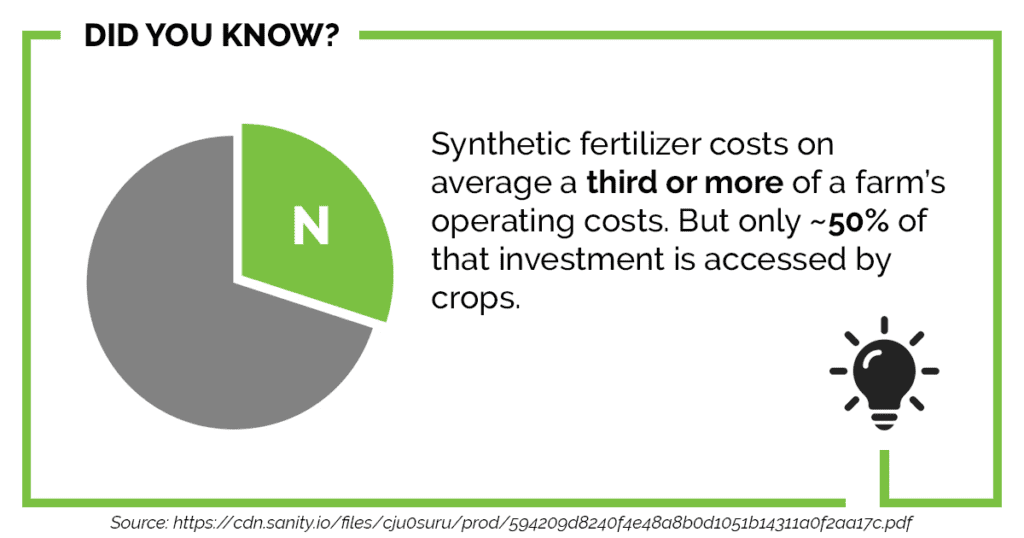
What does Pivot Bio do that helps create more sustainable fields, resilient crops, and boosts yields? It all comes down to biological nitrogen fixation (BNF) and the nitrogen cycle.
Today, we will delve into Pivot Bio, answering the question ” What does Pivot Bio do?” while also exploring how Pivot Bio harnesses the power of synthetic biology to optimize BNF, enabling plants to access nitrogen directly from the atmosphere.
What Does Pivot Bio Do? The Nitrogen Cycle and Nitrogen Fixation
The nitrogen cycle is defined as the chemical and biological processes that describe how atmospheric nitrogen is converted into forms that support life and then back to a stable gas. Microorganisms convert stable atmospheric nitrogen to molecules that are chemically reactive, collectively called reactive nitrogen (Nr). Reactive nitrogen includes ammonium (NH4+) and nitrates (NO3-), which plants use as nutrients.
Part of this cycle is biological nitrogen fixation (BNF). Bacteria called diazotrophs convert atmospheric nitrogen to ammonia (NH3), ammonium, and nitrates. The bacteria feed on sugars from the plants and release reactive nitrogen, which the plant can access via their roots.
Because these microbes share a mutualistic relationship with plants, BNF can be used to fertilize crops. Researchers at Pivot Bio analyzed microbes to find those with DNA that gave them a naturally strong ability to convert nitrogen. Once the specific microbes were selected, Pivot Bio identified genes that could be activated or deactivated to improve the microbes’ nitrogen production and release rates. The results were a set of microbes that made BNF a viable option for modern farming.
The Impact of Pivot Bio on Crops

So, what does Pivot Bio do when compared to synthetic fertilizers? Well, estimates place synthetic fertilizer costs at a third or more of a farm’s operating costs. But only about 50% of that can be accessed by crops. The remainder is wasted as it volatilizes or leaches from the soil. The microbes in Pivot Bio reduce that waste in two ways.
First, less synthetic fertilizer needs to be purchased. The shift to incorporate BNF is a cost offset that functions as an investment to secure future soil health and crop productivity. Second, because the microbes adhere to the plants’ roots, more nitrogen is actually available to the plants and not lost to air, soil, or water. According to Pivot Bio’s research, crops planted with Pivot Bio PROVEN 40 take in about 14% more nitrogen than crops without it.
The improved nitrogen uptake helps with crop yield and resilience. One of the ways you can see this is by the larger plants and root systems. The size of a plant’s root system impacts its resilience and how it can respond to stressors. Stronger, larger root systems reduce the effects of stress from weather and soil quality. It also allows the plants to grow larger and improves crop yields.
What Does Pivot Bio Do to Shape The Environmental Footprint of Farming Operations?
The lost synthetic fertilizer has broader impacts than a farm’s productivity. The nitrogen in wasted fertilizer is exposed to other compounds and water. The reactions that occur contribute to greenhouse gasses and pollution-related health problems, acidification of soil, eutrophication in nearby waterways, and wasted power consumption.
- Reaction byproducts include nitric oxide (NO), nitrogen dioxide (NO2), and nitrous oxide (N2O). Nitric oxide and nitrogen dioxide are usually lumped together in a single term, NOx. Particulate forms of ammonia, ammonium, and NOx are air pollutants known to cause or aggravate respiratory and cardiovascular diseases. Nitrous oxide is a greenhouse gas that is about 300 times more damaging than carbon dioxide (CO2) and is known to deplete stratospheric ozone.
- Excess nitrogen in soil causes acidification. The chemical reaction that converts excess ammonium to nitrate produces hydrogen cations, which lower the pH of the soil and damage crop roots.
- When NO3 leaches into nearby waterways, it spurs the growth of algae or other microorganisms. Excessive growth is called eutrophication and significantly changes the amount of oxygen available for aquatic animals. While some eutrophication is natural, run-off from synthetic fertilizers is a major cause. In the worst cases, species die off in the impacted areas, which cascades to impact other animals, reducing diversity and altering the balance of animal food chains.
- The amount of energy used in the Haber-Bosch process is very high. To produce enough synthetic ammonia to fertilize a single acre of corn, the process takes the same amount of power as an average home in the US uses in a month.
But the answer to the environmental impact of nitrogen pollution is not to cut out synthetic fertilizers altogether. Without fertilizer, countries would struggle to feed their populations. Instead, Pivot Bio uses BNF to reduce the amount of synthetic fertilizer that needs to be used, therefore reducing the amount of wasted nitrogen in the environment.
Red Barn Enterprises And Pivot Bio: The Answer to Modern Farming
Red Barn Enterprises provides quality products and services for more sustainable and productive farms. Pivot Bio products are just one of the available solutions we offer to help boost crop yields and produce more resilient crops.
Want to hear it from our farmers?
Getting Started With Red Barn Enterprises
So, what does Pivot Bio do? For the modern farmer, it continues to offer a revolutionary alternative to traditional synthetic fertilizers. By leveraging microbial technology, Pivot Bio ensures that plants receive a steadier, more efficient supply of nitrogen. This not only increases crop resilience but also enhances overall farm sustainability.
Partner with Red Barn Enterprises and discover the powerful impact of Pivot Bio’s innovative microbial solutions tailored to your farming needs. Our experienced team is dedicated to providing comprehensive support, from detailed scientific explanations to hands-on field applications, ensuring you harness the full potential of advanced nitrogen fixation for maximized crop yields.
Ready to Start?
Don’t miss out on another growing season. Reach out to us now to learn how Pivot Bio can make a significant difference in your agricultural operations.

Leave a Reply